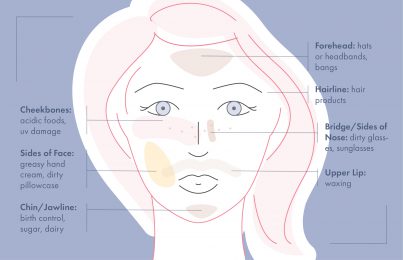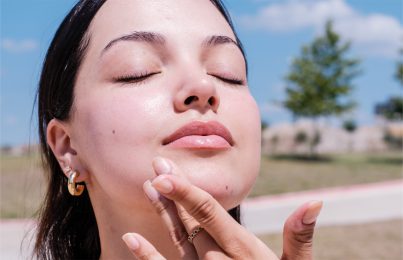If you struggle with stubborn, hormonal acne, you might already know about the supposed link between cystic breakouts and certain foods. One theory is that high-glycemic foods, such as sweets and white bread, can trigger hormonal breakouts by fueling the body’s inflammatory response (after all, acne is an inflammatory condition). Another theory is that dairy can trigger cystic acne. I’ve helped so many clients with persistent hormonal breakouts in my 30 years as an esthetician, and questions about dairy have come up again and again. The answer isn’t so simple—not all dairy is created equal, and research on the topic is a little sparse.
In this post, I’ll explain the link between dairy and cystic acne. I’ll also provide a game plan for what to do if you suspect dairy could be making your breakouts worse.
Why Hormonal Breakouts, and Why the Chin and Jawline Area?
When we talk about the possible link between dairy and breakouts, we’re specifically talking about hormonal (cystic) breakouts. Cystic blemishes are those hard, often painful, bumps that never come to a head. They just sit there and can seemingly take forever to go away.
It’s incredibly common to get hormonal breakouts on the chin and around the jawline. Hormones trigger oil glands, of which there are many in these areas. Since hormones are fat soluble, the body will use these glands as an avenue of excretion for fat-based hormones.
What is the Link Between Dairy and Hormonal Breakouts?
Experts hypothesize that, since the majority of milk comes from pregnant cows (and some cows in the U.S. are given additional growth hormones), the hormone levels in milk may play a role in excess sebum production, which promotes acne. In other words, the consumption of certain dairy products may influence the hormones that trigger oil production in the skin to ignite the breakout process.
It’s important to note that dairy is not the cause of hormonal breakouts. A combination of internal factors like genes and hormonal fluctuations is ultimately to blame. You’re either predisposed to acne, or you’re not. That said, external factors (like dairy) can definitely be triggers that make breakouts worse and more difficult to manage.
Got (Skim) Milk? Not All Dairy Products Are Created Equal
If you’ve been reading all this thinking, “But I can’t give up cheese!” I get you—and I have some good news! Although there isn’t a ton of research about the link between dairy and cystic breakouts, what we do have shows that only specific types of dairy seem to have an impact (statistically speaking). Specifically, milk is what continues to get called out. Even more specifically, the strongest link seems to be between skim milk and breakouts. Low-fat dairy in general is thought to be more likely to trigger breakouts than full-fat dairy products. (Cheese lovers, rejoice.)
Now, this isn’t to say that it’s impossible for full-fat dairy products to stimulate breakout activity. As I said, the research is sparse, and a lot of what we know is anecdotal. This is why it’s really important to experiment for yourself to try to get a sense of what does or doesn’t work for your skin.
What to Do If You Suspect Dairy Is Triggering Cystic Breakouts
If you suspect dairy could be an acne trigger for you, try cutting it out of your diet completely for three weeks to see if there’s any improvement. If you tend to get cystic breakouts around your cycle, start cutting out dairy as soon as your period ends to see if it impacts the next one.
Once you’ve established a baseline, try slowly adding in different types of dairy. Adding them in one at a time will make it easier to pinpoint if a certain type of dairy is more problematic for you than others. It can also give you a good sense of your personal tolerance. For instance, some people can consume moderate amounts of dairy without triggering their breakouts. Other people might be able to tolerate very little.
I know this process seems tedious, but if you’re dedicated to getting to the bottom of your hormonal breakouts, it’s worth it. My career as an esthetician has taught me that sometimes, anecdotal experience is the best. No two people are exactly alike. Research is a great tool to guide you, but it’s so it’s important to test things out for yourself.
Speaking of which, here are my other tips for dealing with hormonal breakouts. One of them is to spot-treat blemishes without drying out the rest of your skin, which can make breakouts worse. One of my favorite ways to do this is with the Chin Breakout Treatment Kit.
Remember That the Cause of Breakouts Is Incredibly Hard to Pinpoint
Finally, I want to leave you with a reminder that it’s difficult to isolate a single cause or trigger for breakouts. Acne is incredibly complex, and while I hope this post gets you closer to banishing yours for good, dairy is likely only one piece of the puzzle. I’ve mentioned in this post how powerful anecdotal information can be—here are 11 common causes of adult acne as I’ve observed them in my time as an esthetician.
Celebrity Esthetician & Skincare Expert
As an esthetician trained in cosmetic chemistry, Renée Rouleau has spent 30 years researching skin, educating her audience, and building an award-winning line of products. Her hands-on experience as an esthetician and trusted skin care expert has created a real-world solution — products that are formulated for nine different types of skin so your face will get exactly what it needs to look and feel its best. Trusted by celebrities, editors, bloggers, and skincare obsessives around the globe, her vast real-world knowledge and constant research are why Marie Claire calls her “the most passionate skin practitioner we know.”




Comments:
I completely agree! I have been getting cystic acne since I was 13 (23 now), and I had tried everything. I eliminated absolutely all dairy and soya from my diet and not only have I lost weight, but for the first time I can leave my house without foundation, because my skin is all clear.
Posted By: Nadia |
If you have a dairy allergy can you still use the anti cyst treatment since it contains lactic acid?
Posted By: Jenny Hullander |
Dear Renee,
I have PCOS, and because of this I have severe acne around my jaws and chin, and hairline, most of which is cystic by nature. I have tried everything, and nothing seemed to work. So I turned to Accutane. I did see a lot of relief, but, I think I got scared of the side effects (mainly, depression), and so I discontinued it aftera month. Now, my cystic acne have come back with more force, and I just cant deal with any more… I dont know what to do. I am 31, and cant deal with this! Please Please help.
Posted By: Mary |
Hi Mary, I’m so sorry you’re having to deal with acne. It can be so frustrating. Did you try cutting back on your dairy to see if this helps as I mentioned in this post? Also have you purchased my Anti Cyst Treatment yet to try. Those would be my two suggestions.
Posted By: Renée Rouleau |
I all of a sudden started getting cyst like acne on my jaw line! This lasted for two years until my dad read an article about lactose in milk causing acne. So I cut out all lactose, (only buying lactose free milk, ice cream, etc) and my jaw line cleared up almost immediately! I tested my theory by having real milk or cream and sure enough I would break out. So Im not sure if it would be the same for everyone but maybe before you cut out all dairy products, try lactose free dairy instead!
Posted By: Melissa |
Hi Renée!
Thank you for this enlightening post. I’ve cut out dairy from my diet on and off my entire life, but consistently for the past 3 years with the exception of occasional butter, chocolate, and traces of dairy in some food. Recently I switched from a calcium supplement that was vegan to one that I am not sure of the origins (Quest brand). I have struggled with hormone imbalance as well since I went off birth control a few years ago, and since being back on it, have been much more balanced. I am 24, and recently noticed that my acne has been worse again, primarily along my jaw line (slightly above and slight below) and around my chin. They are painful and quite unsightly. Could what I’m describing be a result of dairy or other intolerance somewhere in my diet?
I greatly appreciate your time and insight!
Posted By: Brittin |
It’s so hard to say why one gets breakouts around the chin but it sounds to me as it is more hormonal, especially if you’re not getting much dairy in your diet. The chin area can certainly be hormonal. You might want to get your hormones checked and see what is going on there. In the meantime, get our Anti Cyst Treatment as that will help treat those, and prevent new ones to when used a few times a week in areas prone to breakouts. Hope this helps! -Renee
Posted By: Renée Rouleau |
Hi, I’m a 27 year old female who began experiencing cystic acne upon turning 20. It would usually appear around my period and linger for months at a time. Birth Control helped… but it wasn’t practical to stay on it forever. I stumbled across this site and ordered the product immediately. I have noticed a drastic decrease in the cystic acne and though at present i have a huge one on my cheek, i believe its because i cheated this month and consumed way too much dairy. I’m about to order my 2nd bottle… the first one lasted really long as well.
Posted By: Tamara |
I’m so glad to hear that the Anti Cyst Treatment is working so well for you, Tamara!
Posted By: Renée Rouleau |
I am a mature woman in my 60s and have suffered with cystic acne most of my life. I am we’ll past menopause with full surgical hysterectomy. The cysts occur on my check and chin. The ones on my chin seem to be associated with white course chin hairs which lie under the skin and grow sideways. Hard to remove the chin hairs and suggestions.? Thank you.
Posted By: Dara |
Hello Dara,
Your best bet for dealing with what is ingrown hairs on your chin is not to tweeze or pull the hair out, but rather TRIM the hair. I’m making an assumption that you tweeze them out when they come to the surface. This will help reduce the cysts you get. Read more about it here. https://blog.reneerouleau.com/2009/11/is-that-a-blemish-on-your-chin-an-ingrown-hair/ But the Anti-Cyst Treatment is your best bet to heal those once they occur. Hope this helps. -Renee
Posted By: Renée Rouleau |
Hi! I have cut out dairy due to cystic acne and it has stopped 100%! My question is regarding Kefir. Do you think dairy Kefir that is lactose free is ok? I cant do yogurt because of the acne but I want the probiotics. Kefir is full of probiotics and lactose free. I know the hormones and sugar are what contribute to the cystic acne. Any thoughts on if Kefir will cause the cystic acne? Its supposed to be so good for you! Thanks!
Posted By: Rhonda |
Hi Rhonda, I’m so glad to hear that your cystic acne has cleared up, that is great news! As for Kefir, it’s hard to say. I suggest that you introduce it to your system very, very slowly and just see how it goes.
Posted By: Renée Rouleau |
Should I store anit-cyst treatment in the fridge to make the potency last?
Posted By: Lynne |
No, it’s not necessary to store in the fridge at all.
Posted By: Renée Rouleau |
I wasn’t drinking milk for a week or two and I didn’t get any cystic acne at all. I was drinking Oat milk to get my calcium though. However, I didn’t know how much avoiding dairy was helping my skin until recently when I’ve been drinking milk again, two cystic spots on my chin 🙁
Okay, I can definitely go without milk.
Posted By: Rachel |